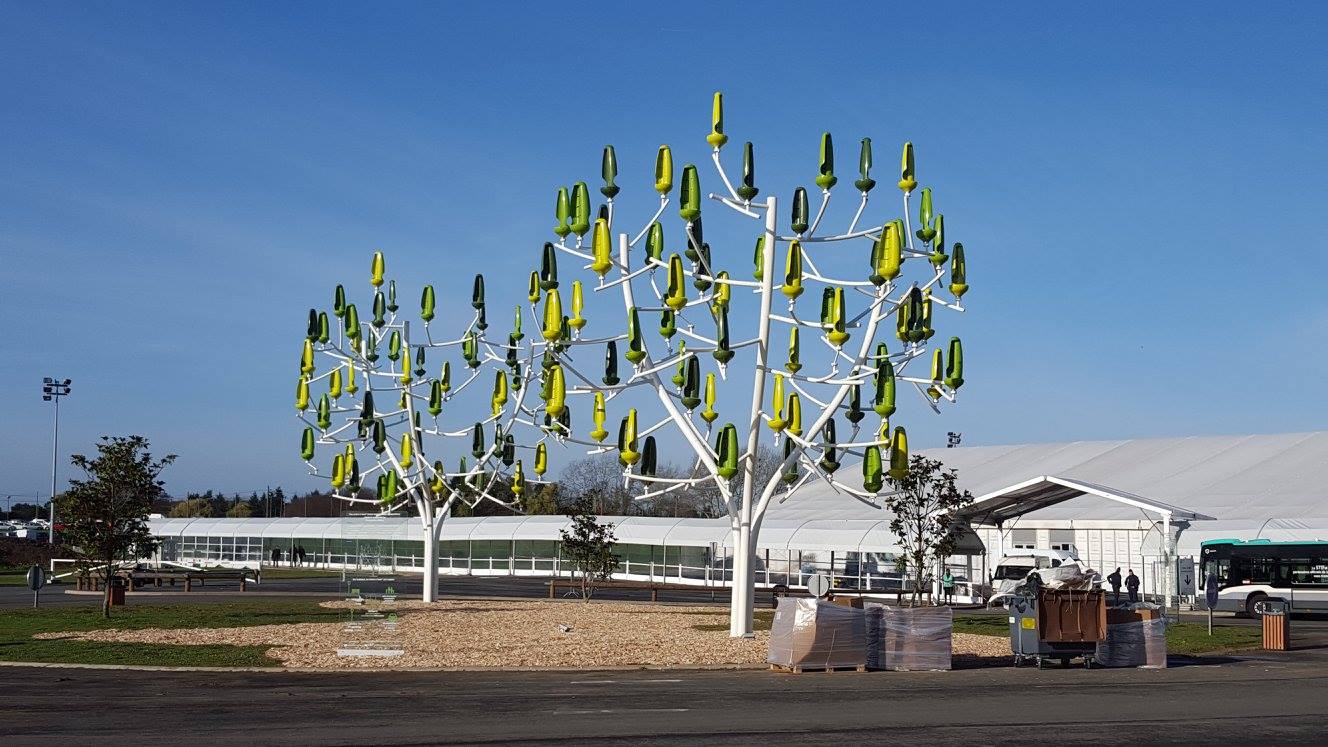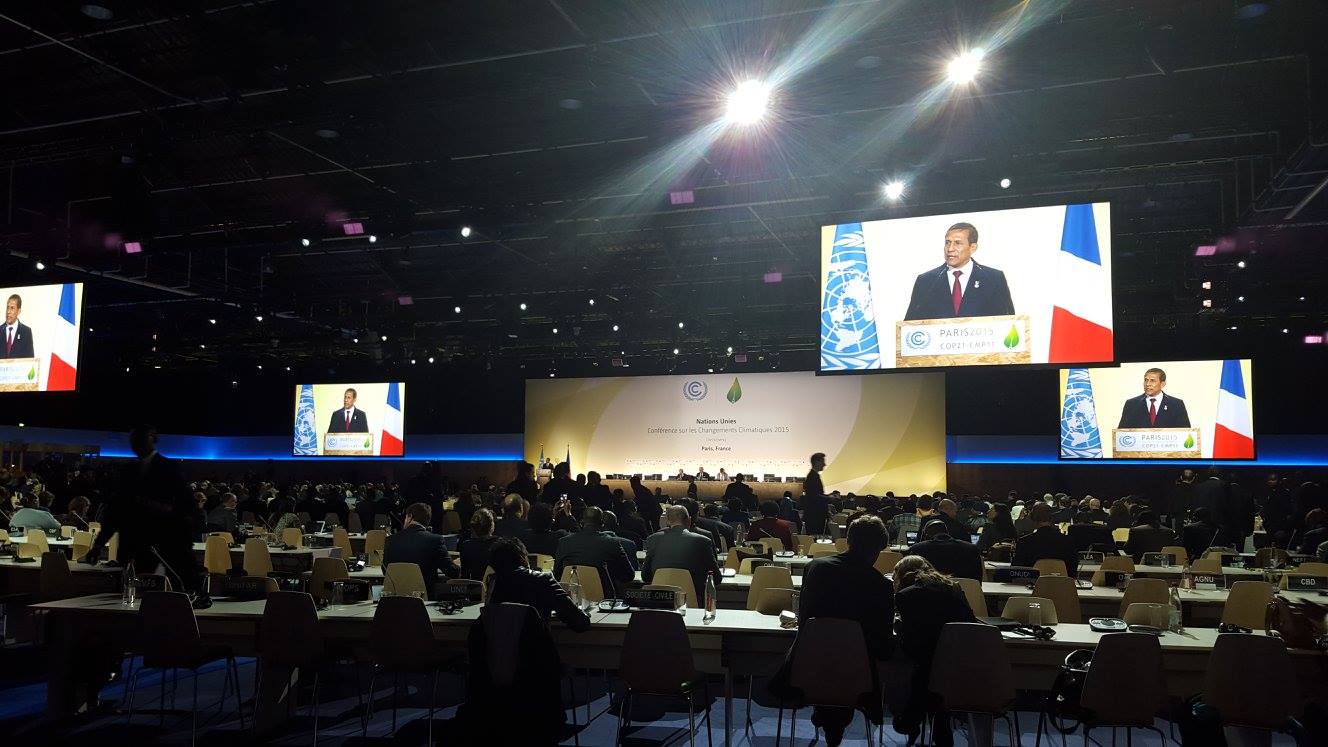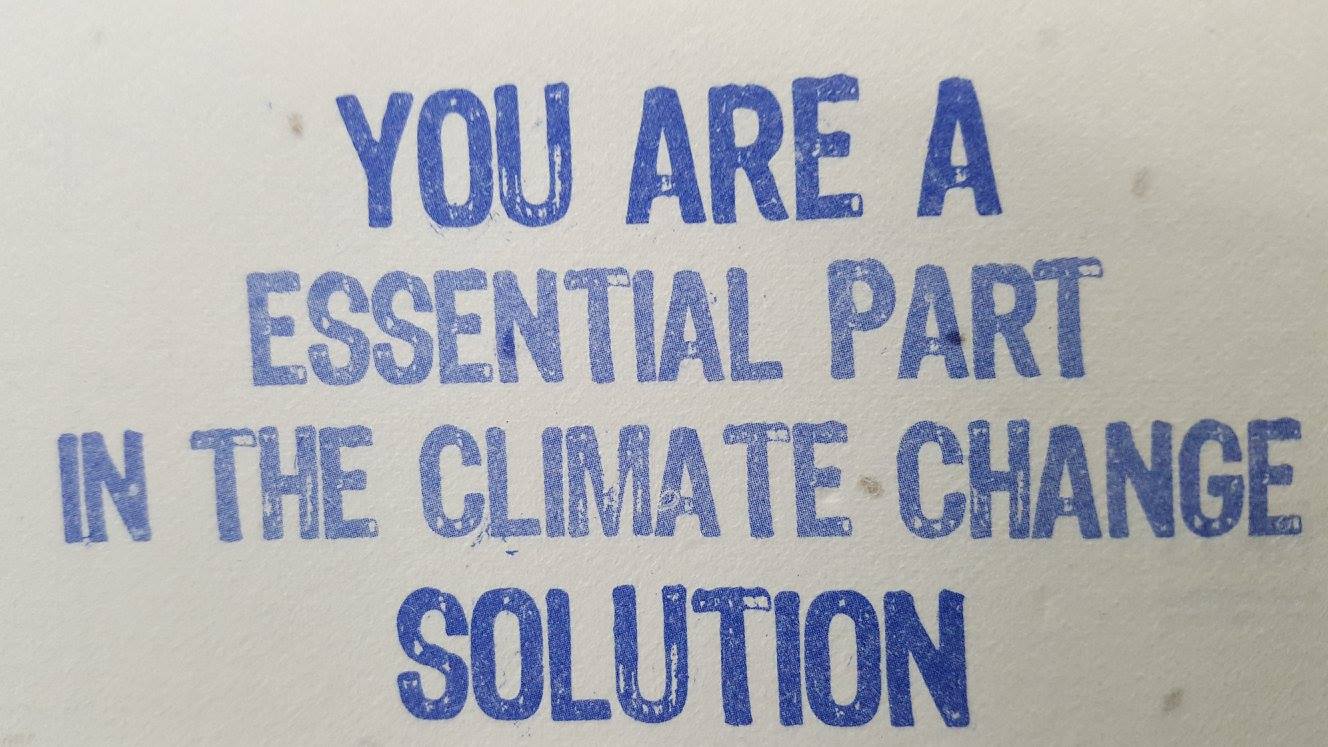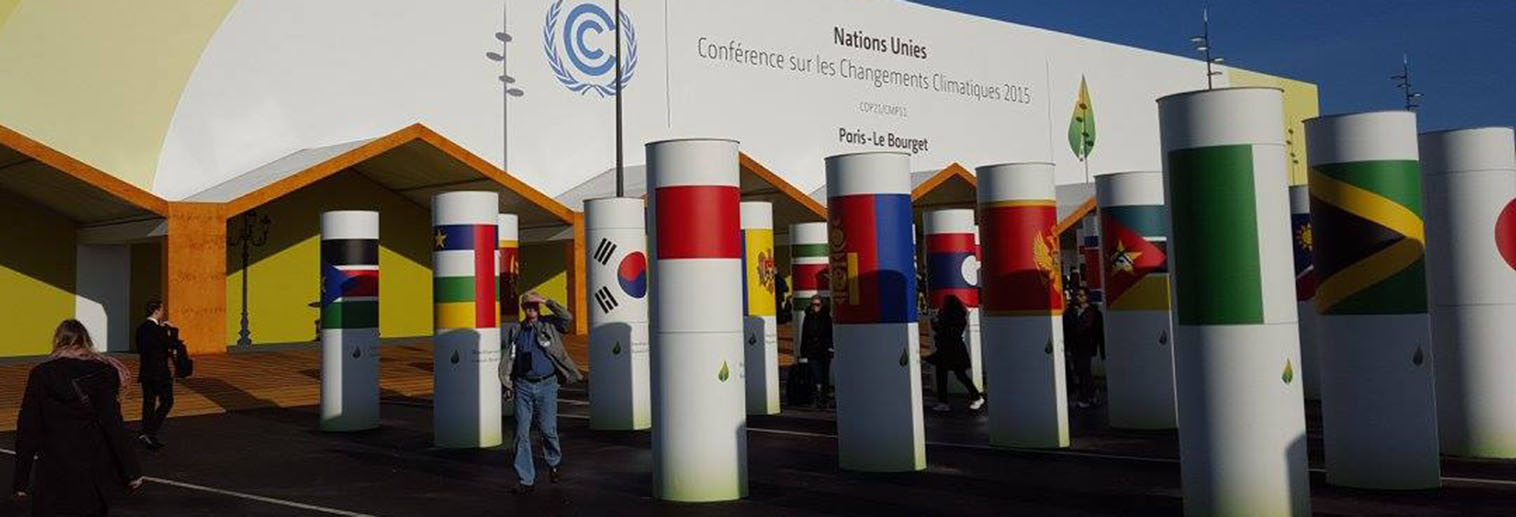Students Reflect On Climate Change Conference
It’s an opportunity of a lifetime—to witness negotiations among the heads of state of 188 nations as they wrestle and debate issues around the mitigation of climate change--one of the most pressing challenges of the 21st century—in a historic push toward the first worldwide agreement to rein in global warming. Five Moravian University students were granted that experience.
Matthew Bosch ’16, Paige Malewki ’16, Laura McBride ’16, Audrey McSain ’16, and Stephen Stoddard ’16 accompanied Diane Husic, dean of the School of Natural and Health Sciences, and Hilde Binford, chair and associate professor in the music department, to the 21st Conference of the Parties (COP21) under the United Nations Framework Convention on Climate Change (UNFCCC), which took place in Paris, France, from November 30, 2015, through December 11.
Husic and Binford have led a delegation to the conference every year since 2009 when Moravian University became one of only six private liberal arts colleges accredited to serve as civil society observers, putting our students in a rather exclusive group of undergraduates. “The large universities take graduate and law-school students,” says Husic. “It is very unusual to encounter undergraduates from these institutes.”
This year the delegation observed a tireless global effort, negotiation on a grand scale, that culminated in the 31-page Paris Agreement to reduce greenhouse gas emissions, signed by every one of the 188 countries represented.
After giving students a wide berth to focus on fall-semester finals, enjoy winter break, and transition into spring, Inside Moravian caught up recently with our UNFCCC civil society observers to hear about their experiences in Paris. Here’s what they told us.

Inside Moravian: What did you learn about climate change that surprised you?
Laura McBride: The courses I’ve taken at Moravian have taught me so much. Going into the conference, I knew the science behind climate change, the importance of modeling, and some of the human rights and social issues. Something that did not necessarily surprise me but always makes me stop and think is that the effects of climate change vary all over the world. In one region, there might be a several-year drought, and in another multiple floods in a short span of time. Because of these diverse impacts, there cannot be just one solution to mitigating and adapting to climate change.
Matt Bosch: Going into the conference I had a skeptical view of how the climate change battle was going, but that changed about halfway through as rumors surfaced that there would be a decent agreement. Those rumors turned into reality. Whether or not the agreement will be kept is another story, but at least the conference showed that global concern for this challenge exists. The conference surprised me in that it taught me to have more hope.
IM: If you were to pull one piece of information or one message from this conference to share with the Moravian University Community, what would it be?
Stephen Stoddard: I would choose the words of the United Nations’ Secretary General, Ban Ki Moon, from his opening remarks: “In the name of climate justice, we must act now!” These words mean a great deal, especially to those on the front lines of climate change who have lost family members to typhoons or drought or to children who miss out on education because they have to walk miles a day to get water for their family. The urgency to act on the issues and implications of climate change--rising sea levels, drought, floods, and famine--on vulnerable communities around the world has never been more paramount. This message set the stage for this distinctive Conference of the Parties because this issue threatens every citizen globally and must be addressed today for the benefit of future generations. If nearly 200 nations can come together to formalize an agreement to address this global issue, then what is stopping the rest of us from acting now for the future we want?
Audrey McSain: I can’t stress enough the importance of taking action to address climate change in our own communities. Climate change affects not only extreme weather but food security, natural resources, and public health among other issues. There is no more time for complacency. We need to acknowledge that it is important and be the leaders taking the initiative to pave our sustainable future now.
LM: We need, here in the United States, to start switching over to a sustainable lifestyle. Talking with people from other countries, especially third-world countries, and learning how they live, it alarmed me how unsustainably we live in America. Though It’s not possible to shift to a 100 percent sustainable lifestyle overnight, we can make changes that will lower the impact of climate change: use LED lights, eat local and organic foods, recycle, and so forth. These are all things that are relatively easy to do. We just have to make a conscious choice to do so.
MB: I would urge people to be informed and vocal. The reason we went to the conference as observers was to come back and talk about what we had seen and learned, so that we could enlighten others. We all live on this planet, so we should all care enough to at least understand what is happening.

IM: What did this event teach you about how nations interact or should interact over global issues?
LM: It showed how important it is for countries to be treated as equals and for each country’s voice to be heard. The United States representative was in the same room with a representative from the small island nation of Tuvalu, and both were treated the same. This is important, because every country has a stake in the climate change crisis, no matter how big or small, and every nation will be needed to achieve the goal of the agreement.
SS: Witnessing how an intergovernmental process works firsthand was an opportunity I am extremely grateful for. What I imagined the conference to be like was nothing compared to the reality. From the venue itself to the negotiations I was impressed by the inclusive and transparent approach. Documents were made readily available, and everyone had a chance to voice his or her opinion whether through contact individuals or representatives. I especially was intrigued by the space made available for observers, like me and my fellow students, to view a live-stream of the negotiations with the draft agreement projected on screens so we could read along with the invested parties and see who was objecting and why.
Inside Moravian: Did this experience teach you anything about negotiations and what makes them successful or unsuccessful?
AM: Going into this I wanted nothing more than to see how the process works (or doesn’t), so watching the negotiations was one of the highlights of attending the conference. In spite of the tension, stalling tactics, massive amount of work, and anything else that occurred, COP21 proved to be successful. I think coming together with a goal and strict deadline in mind, along with working both inclusively and relentlessly to achieve that goal, played a huge role in that success. There was also a sense of transparency and willingness to accommodate the delegations’ needs while staying within the time restrictions.
MB: Compromise is key for negotiations like this one to come to an agreement. Every party involved has to understand that in order to win one battle, it may be necessary to put another battle on pause. For example, in order for certain countries to agree to the climate change demands, issues such as women's equality had to be removed, but that doesn't mean the battle for women's rights will not resurface.

IM: Did you have any experience that might make you think more critically or deeply about the information you read/hear in the news about climate change? And do you feel the U.S. media accurately portrays the important issues surrounding climate change?
LM: The United States media does not cover climate change accurately. We are the only country in the world that has the debate about whether or not climate change is even real. The fact that the media allows these false opinions to spread and gives them as much credit as the scientifically proven facts that climate change is occurring as we speak is unfortunate.
IM: Do you feel our leaders are accurately representing climate change to the U.S. citizenry?
SS: Unfortunately, I do not think all of our political leaders represent U.S. citizens when it comes to climate related-topics. Many still deny the science of climate change, which is completely irrational when the evidence is so clear; however, with that said, I think if Americans really want to see great change in political leadership on this issue then they need to let their voices be heard through elections.
IM: What was the best moment or experience from the week?
AM: One of the best experiences occurred on the very first day of the convention. Stephen Stoddard and I had an internship with the Citizens Climate Lobby and the United Nations, with Sarabeth Brockley `10 as our UN advisor. Sarabeth was able to get the two of us high-level badges that allowed us access into the same rooms as the heads of state as they made their opening remarks.
We entered an enormous room filled with filled with leaders of nations, members of delegations, and representatives of various NGO’s and other organizations. Four giant screens hung from the ceiling so everyone in the room could see the speakers. We heard from the President of Finland and Malaysia, and numerous other leaders from South America, Africa, Europe, and more. Each had their own style, but all shared very similar themes at the same time.
They talked about their nation’s efforts to mitigate climate change, shared the expectations they held for the agreement and the world, and served as inspiration to work toward new future. What affected me most were the stories of how climate change directly impacts each nation. Quite honestly, after listening to the remarks for some time, tears came to my eyes as it struck me that nearly every world leader was present and making a case for humanity to come together in such a pivotal time.
MB: I don't know if I can say there was a best moment, they were all new and amazing. Being in Paris of all places, for a very significant cause, was awe inspiring. Between the history and atmosphere of the city, to the current history that was being made at the conference, I didn't want to leave. It was all fantastic and I wouldn't trade any of the experience for anything.
IM: How did you feel about attending the conference given the terrorist attacks that had occurred so recently prior to the conference?
AM: We all knew that there were risks involved, and it was not something that we took lightly. We spent a lot of time thinking about it individually as well as talking together as a group. I think it would be unnatural to not have some sense of uneasiness or fear heading into this.
Despite the uneasiness, there are things in this world that are bigger than you, me, or an entire nation. Climate change is a global issue that needs not just attention but action. We cannot give into fear and let it dictate our lives, let alone prevent us from coming together to work on global issues. As a group we were not reckless or rash in making our decision to go, but after long consideration simply decided that the importance of attending COP21 far outweighed the risks.
A little revolutionary, don’t you think?

